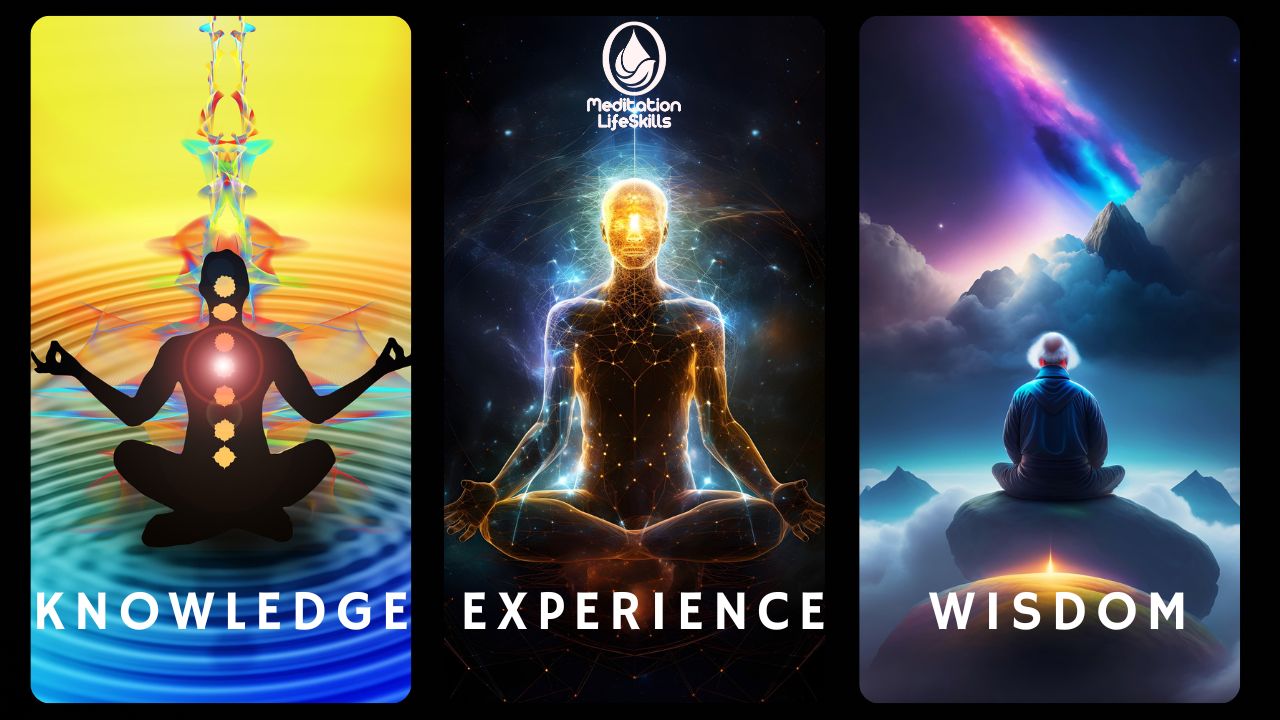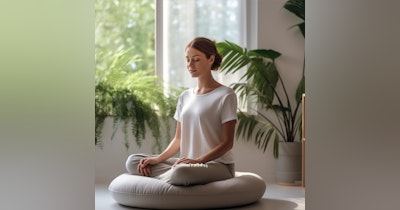Meditation is an ancient practice that has been used for centuries to cultivate a sense of tranquility, focus, and clarity. It involves training the mind to achieve a deep state of relaxation and heightened awareness, which can help alleviate anxiety symptoms.
GET STARTED TODAY WITHOUT ANY RISK!
Get 7 Days of Unlimited Access Right Now
for Free When You Download Our App!
A life of transformation begins with action. There are seven stages of meditation instruction on a single platform. Live monthly Zoom coaching and training sessions.
Get unlimited free access to the Meditation Life Skills app for 7 days by downloading it now! Visit MeditationLifeSkills.com.
In today's fast-paced world, anxiety has become a common issue that affects many people's mental health and overall well-being.
While there are various ways to manage anxiety, meditation has proven to be an effective tool to find inner peace and calm.
In this article, we'll explore how meditation can help you manage anxiety and provide you with some tips on how to get started with a meditation practice.
Whether you're a beginner or an experienced meditator, you'll find some valuable insights and techniques that will help you find inner peace and calm in your daily life.
Understanding Anxiety
Anxiety is a natural response to stress and a common human emotion that most people experience at some point in their lives. It's a feeling of apprehension or fear about what's to come, and it can be mild or severe. Mild anxiety can be helpful in some situations, such as before an exam or a job interview, as it can help you stay alert and focused.
However, excessive or chronic anxiety can interfere with your daily activities, relationships, and overall quality of life. Some common symptoms of anxiety include excessive worry, restlessness, irritability, muscle tension, difficulty sleeping, and panic attacks.
Anxiety can be triggered by various factors, such as genetics, environment, life events, and personality traits. It's essential to understand the root cause of your anxiety to manage it effectively.
Some common triggers of anxiety are financial problems, health issues, relationship conflicts, work stress, and social anxiety. If you're experiencing anxiety symptoms, it's important to seek professional help from a mental health provider to get an accurate diagnosis and treatment plan.
What is Meditation?
Meditation is a mind-body practice that involves focusing your attention and breath to achieve a state of calm and relaxation. It's an ancient practice that has been used for centuries in various traditions, such as Buddhism, Hinduism, and Taoism.
Meditation can be done in various forms, such as sitting, walking, standing, or lying down, and it can be practiced by anyone, regardless of their beliefs or background.
Meditation involves training your mind to become aware of your thoughts and emotions without judgment or attachment. It helps you cultivate a sense of inner peace, clarity, and compassion towards yourself and others. Meditation can also help improve your concentration, memory, creativity, and overall well-being.
Benefits of Meditation for Anxiety
Meditation has been shown to be an effective tool to manage anxiety symptoms and improve mental health.
Here are some benefits of meditation for anxiety:
Reduces Stress
Meditation can help reduce stress levels by lowering your cortisol levels, which is a hormone that's released in response to stress. Chronic stress can lead to various health problems, such as high blood pressure, heart disease, and depression. By practicing meditation regularly, you can lower your stress levels and improve your overall well-being.
Improves Emotional Regulation
Anxiety can make you feel overwhelmed by your emotions, such as fear, anger, or sadness. Meditation can help you manage your emotions more effectively by developing your emotional regulation skills. It helps you become more aware of your emotions without reacting to them impulsively. By practicing meditation regularly, you can learn to respond to your emotions in a more constructive way, which can help reduce anxiety symptoms.
Enhances Self-awareness
Meditation can help you become more self-aware by developing your mindfulness skills. Mindfulness is the practice of being present in the moment without judgment or distraction. By practicing mindfulness meditation, you can become more aware of your thoughts, emotions, and bodily sensations. This can help you identify your anxiety triggers and manage them more effectively.
Improves Sleep Quality
Anxiety can interfere with your sleep quality, and poor sleep can exacerbate anxiety symptoms. Meditation can help improve your sleep quality by reducing your anxiety levels and promoting relaxation. By practicing meditation before bedtime, you can prepare your mind and body for a restful sleep.
Scientific Evidence Supporting Meditation for Anxiety
Meditation has been extensively studied for its effects on mental health, and there's a growing body of scientific evidence supporting its effectiveness for managing anxiety symptoms.
Here are some studies that have shown the benefits of meditation for anxiety:
- A 2014 meta-analysis of 47 studies found that meditation can reduce symptoms of anxiety, depression, and stress.
- A 2013 randomized controlled trial found that mindfulness meditation can reduce symptoms of generalized anxiety disorder.
- A 2010 study found that mindfulness-based stress reduction can reduce symptoms of anxiety, depression, and stress.
- A 2008 study found that a 10-day meditation retreat can reduce symptoms of anxiety, depression, and anger.
These studies suggest that meditation can be an effective tool to manage anxiety symptoms and improve mental health.
Different Types of Meditation for Anxiety
There are various types of meditation that can help alleviate anxiety symptoms. Here are some of the most common types of meditation:
Mindfulness Meditation
Mindfulness meditation involves focusing your attention on your breath and becoming aware of your thoughts, emotions, and bodily sensations without judgment. It helps you develop your mindfulness skills and become more present in the moment.
Loving-Kindness Meditation
Loving-kindness meditation involves cultivating feelings of love, compassion, and kindness towards yourself and others. It helps you develop your empathy skills and become more connected with others.
Body Scan Meditation
Body scan meditation involves scanning your body from head to toe and becoming aware of your bodily sensations. It helps you develop your body awareness skills and become more attuned to your physical needs.
Chakra Meditation
Chakra meditation involves focusing on the seven energy centers in your body and balancing your energy flow. It helps you develop your spiritual awareness skills and become more aligned with your higher self.
Movement Meditation
Movement meditation involves using movement, such as yoga or tai chi, to achieve a state of relaxation and mindfulness. It helps you develop your body-mind connection and become more grounded.
How to Start Meditating for Anxiety
If you're new to meditation, it can be challenging to know where to start. Here are some tips on how to start meditating for anxiety:
1. Start Small
Start with a short meditation session, such as five minutes, and gradually increase your practice time as you become more comfortable with it. Don't pressure yourself to meditate for long periods if you're not ready yet.
2. Find a Quiet Place
Find a quiet place where you won't be interrupted, such as a peaceful room or a natural setting. Turn off your phone and other distractions that can interfere with your meditation practice.
3. Sit Comfortably
Sit comfortably in a chair or on a cushion, with your back straight and your hands resting on your lap. You can also lie down if that's more comfortable for you.
4. Focus on Your Breath
Focus your attention on your breath and become aware of the sensation of air flowing in and out of your nostrils. If your mind wanders, gently bring it back to your breath without judgment.
5. Be Patient
Don't expect immediate results from your meditation practice. It takes time and patience to develop your meditation skills and reap its benefits. Be kind and compassionate towards yourself and enjoy the process.
Creating a Meditation Routine
To get the most out of your meditation practice, it's essential to create a routine that works for you.
Here are some tips for creating a meditation routine:
1. Set a Regular Time
Set a regular time for your meditation practice, such as in the morning or before bedtime. Consistency is key to develop your meditation skills and make it a habit.
2. Create a Sacred Space
Create a sacred space for your meditation practice, such as a corner of your room or a special room. Decorate it with items that inspire you, such as candles, incense, or crystals.
3. Use Guided Meditations
Use guided meditations to help you get started with your meditation practice or to explore different types of meditation. There are many free guided meditations available online or through meditation apps.
4. Join a Meditation Group
Join a meditation group to connect with like-minded individuals and deepen your meditation practice. You can find meditation groups in your local community or online.
Tips for a Successful Meditation Practice
Here are some tips to help you have a successful meditation practice:
Be Consistent
Consistency is key to develop your meditation skills and make it a habit. Try to meditate every day, even if it's for a short period.
Be Patient
Don't expect immediate results from your meditation practice. It takes time and patience to develop your meditation skills and reap its benefits. Be kind and compassionate towards yourself and enjoy the process.
Don't Judge Yourself
Don't judge yourself if your mind wanders during your meditation practice. It's normal to have thoughts and emotions arise during meditation. Just gently bring your attention back to your breath without judgment.
Experiment with Different Types of Meditation
Experiment with different types of meditation to find the ones that work best for you. Everyone's meditation practice is unique, so don't be afraid to try new things.
Be Open-Minded
Be open-minded and curious about your meditation practice. Don't cling to expectations or preconceived notions. Allow yourself to be present in the moment and experience your meditation practice fully.
Other Practices to Complement Meditation for Anxiety
Meditation can be complemented by other practices that can help manage anxiety symptoms. Here are some practices that you can try:
Yoga
Yoga is a mind-body practice that combines physical postures, breathwork, and meditation. It can help reduce stress levels, improve flexibility, and enhance body awareness.
Exercise
Regular exercise can help reduce anxiety levels by releasing endorphins, which are feel-good hormones. It can also improve your overall physical health and well-being.
Cognitive-Behavioral Therapy
Cognitive-behavioral therapy (CBT) is a type of talk therapy that can help you identify and change negative thought patterns and behaviors that contribute to anxiety. It can be done individually or in a group setting.
Mindful Breathing
Mindful breathing involves focusing your attention on your breath and becoming aware of its rhythm and depth. It can help you relax and reduce anxiety symptoms.
Conclusion and Final Thoughts
Meditation is a powerful tool to manage anxiety symptoms and improve mental health. It can help you cultivate a sense of inner peace, calm, and clarity in your daily life. By practicing meditation regularly, you can reduce stress levels, improve emotional regulation, enhance self-awareness, and improve sleep quality.
There are various types of meditation that you can try, such as mindfulness, loving-kindness, body scan, chakra, and movement meditation. To start meditating for anxiety, you can find a quiet place, sit comfortably, and focus on your breath.
Creating a meditation routine can help you make it a habit and get the most out of your practice. Remember to be patient, compassionate, and open-minded about your meditation practice, and enjoy the journey towards inner peace and calm.















